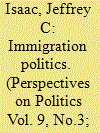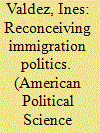|
|
|
Sort Order |
|
|
|
Items / Page
|
|
|
|
|
|
|
| Srl | Item |
| 1 |
ID:
110949


|
|
|
|
|
| Publication |
2011.
|
| Summary/Abstract |
"You are a Greek Jew? I thought all Greeks were Orthodox?" As a Jewish-American growing up in New York City, whose paternal grandparents were Jews who had emigrated from Greece in the 1920s, I was frequently asked this question by well-meaning-if confused-friends and acquaintances. Indeed, while "Greek Jew" has always been a central aspect of my multiply-hyphenated American identity, in fact my grandfather Morris Isaac, né Izaki, was from Salonika and, it turns out, he himself grew up as a Turkish Jew under the Ottoman Empire, only to discover after World War I that he was in fact (now) not a Turkish but a Greek Jew (which was not, in the parlance of his time, synonymous with being an authentic "Greek"). Greek (Orthodox) or Jewish? Greek or Turkish? Pogroms, wars, "ethnic cleansings," and sometimes even genocides have been undertaken to resolve such questions, and indeed my ancestors experienced all of these things in the opening decades of the twentieth century. For my family, such traumas are part of the story of how my grandparents came to leave Greece and migrate to the US and become Americans and US citizens (alas, many of their relatives were not able to leave, and most ultimately perished at the hands of the Nazis).
|
|
|
|
|
|
|
|
|
|
|
|
|
|
|
|
| 2 |
ID:
159513


|
|
|
| 3 |
ID:
171337


|
|
|
|
|
| Summary/Abstract |
This article theorizes the circulation of violence in the realms of immigration and labor. Through Walter Benjamin, I conceptualize the relationship between racial violence and law, and note that although violence can support the authority of law, excessive violence makes law vulnerable to decay. This tension between authority and excess is eased by humanitarianism. I find clues for disrupting this circulation in Benjamin’s twin notions of the real state of exception and the general strike, introduced two decades apart and invested in theorizing how labor and other marginalized groups threaten the stability of law supported by violence. This reconstruction proceeds alongside an examination of the contemporary US regime of immigration enforcement, which combines the excessive violence of detention and deportation with marginal humanitarian adjustments, which ultimately legitimate violence. On the disruptive side, a Benjaminian reading of labor activism by the Coalition of Immokalee Workers offers three dimensions of emancipatory politics: (a) practices of refusal (to engage on the terms of the immigration debate), (b) the establishment of historical constellations (of racial regulation of labor constitutive of law), and (c) divine violence (through exposure of lawful violence in the food production chain).
|
|
|
|
|
|
|
|
|
|
|
|
|
|
|
|
| 4 |
ID:
133750


|
|
|
|
|
| Publication |
2014.
|
| Summary/Abstract |
Both the Russian public and its elites were taken by surprise by the fact that Russia has become an immigration country. It has resulted in widespread anti-immigrant sentiments and inconsistency in government actions. Russian immigration politics, as well as immigration politics in liberal democracies of the West, are characterised by a wavering between protectionist and liberal laissez faire approaches. This leads to a mismatch between public rhetoric and legal decisions. However, two features seem to make the Russian situation specific: open borders with most of the countries of the former Soviet Union and omnipresent corruption. Corruption results in a discrepancy between formal (legal) decisions and informal (illegal) practices.
|
|
|
|
|
|
|
|
|
|
|
|
|
|
|
|
|
|
|
|
|